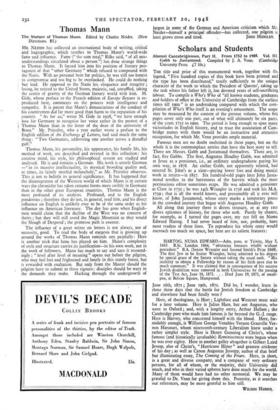Scholars and Students
THE title and price of this monumental work, together with the legend, " Five hundred copies of this book have been printed and the type has been distributed," testify sufficiently to the unique character of the work to 'which the President of Queens', taking up the task where his father left it, has devoted years of self-sacrificing labour. To compile a Who's Who of "all known students, graduates and holders of office at the University of Cambridge from the earliest times till istoo " is an undertaking compared with which the com- pilation of Who's Who itself is an evening's amusement. The scope may be measured by the content of the present volume, whose 619 pages cover only one part, out of what will ultimately be_ six parts, of the years 1752 to 19oo. The period is long enough to span many vicissitudes in English history, and to trace the association of Cam- bridge names with them would be an instructive and attractive occupation, for which Mr. Venn provides ample material.
Famous men are no doubt enshrined in these pages, but on the whole it is the commonplace entries that have the best story to tell. There are Messrs. Gabb and Justamond themselves. There are, in fact, five Gabbs. The first, Augustus Hoadley Gabb, was admitted at Jesus as a pensioner, i.e., an ordinary undergraduate paying his own way, in 1878. An earlier Gabb, not apparently related, had entered St. John's as a sizar—paying lower fees and doing menial work in return—in 1857. Six hundred-add pages later John Justa- mond testifies to the barrenness of the harvest which the most pertinacious editor sometimes reaps. He was admitted a pensioner at Clare in 1752 ; he was 14th Wrangler in 1756 and took his M.A. 1759 ; that is all the world knows, and presumably all it ever will know, of John Justamond, whose entry marks a temporary pause in the crowded journey that began with Augustus Hoadley Gabb.
All along that journey there is divers treasure, or at any rate divers epitomes of history, for those who seek. Purely by chance, for example, as I turned the pages over, my eye fell on Numa Edward Hartog. I had never heard of him, nor, probably, have most readers of these lines. To reproduce his whole entry would encroach too much on space, but here are its salient features :
HARTOG, NUMA EDWARD.—Adm. pens. at Trinity, May 3, 1865. B.Sc. London 1864, "obtaining honours wholly without precedent." B.A.(Senior Wrangler and Second Smith's Prize 1869). The first Jew to be Senior Wrangler, being admitted to his degree by special grace of the Senate without taking the usual oath. "His inability to obtain a Fellowship by reason of his faith gave rise to much comment." It was claimed that in consequence of his success Jewish disabilities were removed in both Universities by the passing of the Test Act, June 16, 1871. . . . Died June 19, 1871, of small- pox, at Belsize Square, Hampstead. June 16th, 1871 ; June 19th, 1871. Did he, I wonder, learn in those three days that the battle for Jewish freedom at 6ambridge and elsewhere had been finally won ?
Here, of theologians, is Hort ; Lightfoot and Westcott must wait for a later volume. kere is Julius Hare, but not Augustus, who went to Oxford ; and, with a lengthy entry, Arthur Hallam ; the Cambridge poet who made him famous is far beyond the G.-J. range. Here is Harvey, who concerned himself with the blood. Here, for- midably enough, is William George Venables Vernon Granville Ver- non Harcourt, whom nineteenth-century Liberalism knew under a rather simpler style. Here is Henry Gunning of Christ's, whose famous (and historically invaluable) Reminiscences were begun when he was over eighty. Here in another galley altogether is Gilbert Laird Jessop, also of Christ's, " Hurricane Hitter " and greatest cricketer of his day ; as well as Canon Augustus Jessopp, author of that brief but illuminating essay, The Coming of the Friars. Here, in short, is a great and diverse company, and a company of very ordinary persons, for all of whom, or the majority, their University did much, and who in their varied spheres have done much for the world. Many of them would have had no other memorial. We may be grateful to Dr. Venn for giving them this. Posterity, as it searches out references, may be more grateful to him still.
WILSON HARRIS.






























 Previous page
Previous page